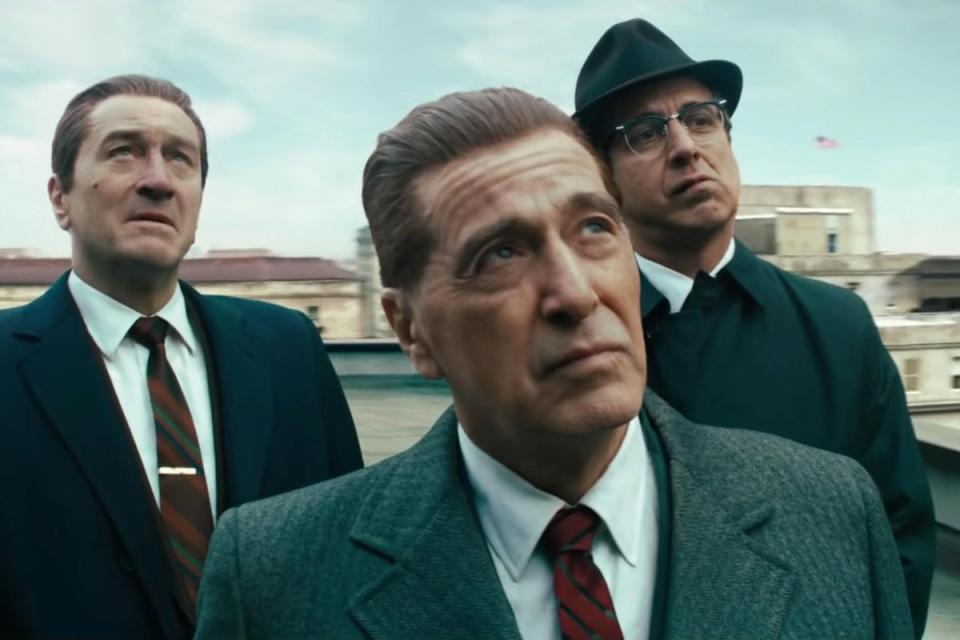Awarding 'The Irishman' Best Picture Would Be a Step Backward, Not Forward
This article is part of Esquire's Oscars series in which we consider if each Best Picture nominee at 2020 Academy Awards should or should not take home the night's highest honor. Read the rest of the Oscars series here.
Barely an hour into my first viewing of The Irishman, I fell asleep. I felt guilty. Colleagues explained to me that this is cinema. Film nerds lauded this as Scorsese's greatest epic. If memory serves me correctly, a stranger on the street might have grabbed me by the collar and screamed, "FINALLY, THE STORY OF JIMMY HOFFA HAS COME TO THE SCREEN." People were ecstatic about The Irishman, and my weighty eyelids had forsaken me. I decided not to tell anyone and try again—I fell asleep. Eventually, I settled in on a Saturday morning with a pot of coffee, and my first successful watch commenced.
After all of that, my feelings were pretty succinct: It was fine. I wouldn't call it bad, but I also wouldn't call it monumental. It's like a Scorsese Now That's What I Call Music compilation, it's a victory lap. And because it's a legendary director doing what he does best once again, we feel compelled to love it. But we should be challenging and awarding the greatest minds in cinema to take risks, to do more than play the hits. But critics love something familiar, as does the Academy. Reviews called the film a perfect "autumnal" offering from Scorsese. Audiences loved seeing some of the greatest mob stars of their generation on screen together.
But all of that is also why I felt annoyed by it. Those reactions affirmed that The Irishman is simply a regurgitation of the past. Scorsese is at peak Scorsese in The Irishman, but it's nothing we haven't seen before (questionable CGI, notwithstanding). And the reason it landed a Best Picture nomination is because audiences and the Academy love nostalgia, basking in the everlasting glow of legendary filmmakers. Legacy does not alone make a cinematic achievement, nor is it enough to trot out the night's biggest honor.
Scorsese's press tour around the film has been filled with equally antiquated ideas. Released on Netflix, he's made it clear that he believes it should be seen on the big screen. He defended his decision to keep Anna Paquin a relatively silent character (to be fair, this is a decision she agreed with). He loudly lambasted superhero movies as theme park rides, when The Irishman is something of a theme park ride through Scorseseland. The Irishman's egregious three and a half hour run time was excused because this is Scorsese. And while the notions of the artist should be considered, it also ignores the taste of the audience. The industry is changing, and to ignore that makes this film (and the Academy at large) feel more stale than ever.
If we're looking to honor Scorsese and the great accomplishments he's made, there are lifetime achievements for that very purpose. But the morose cinematography and the erasure of women in a mobster's world feels uninspired. The haphazard use of CGI isn't revelatory—it's more akin to a rotten cherry on top of a stale cake. Films like The Curious Case of Benjamin Button and Tron: Legacy used the technology years before The Irishman ever hit Netflix, and arguably more impressively.

And that leaves us at a place of wondering: why this film? Why is this what we're celebrating? The answer is that Hollywood and the Oscars have a long-standing history of celebrating things that seem familiar. That tracks especially hard for The Irishman: the Academy's make up (as of 2018) is 84 percent white. A 2014 survey noted that the average age was 63. What used to be the most prestigious and commanding film awards in the world is hopelessly out of touch. In a time where globalism is edging its way into film, South Korea's Parasite feels like the timeliest story of the bunch, and yet, it is considered an underdog in this race.
What does that mean for films like The Irishman? For now, they can find a home at the Academy Awards, nestled carefully in the arms of its overwhelmingly white, older audience. But its 10 nominations and Best Picture slot indicate that 2020 is another year that the Oscars remain dedicated to the past, as opposed to looking to the future of storytelling. And much like the first and second times I attempted to watch The Irishman, the world will turn a sleepy eye on this Award show that insists that yesterday's news is tomorrow's innovation.
You Might Also Like

